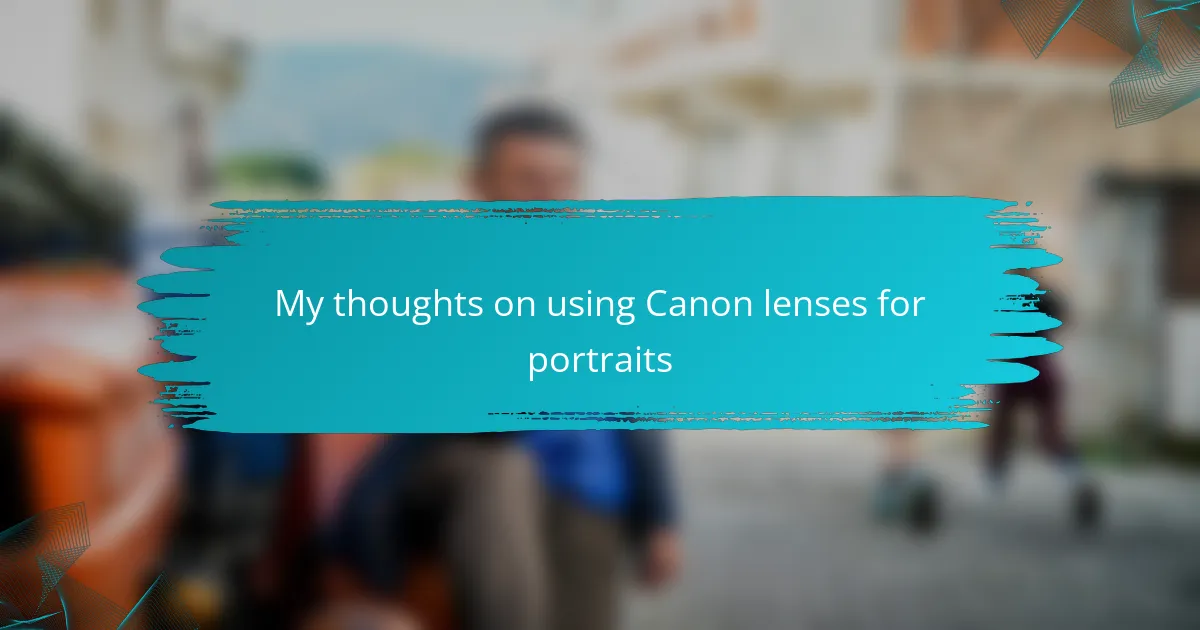Key takeaways
- Canon lenses are highly regarded for their quality and versatility, particularly in wedding and portrait photography.
- Popular choices for portrait photography include the 50mm f/1.8 for sharp images, 85mm f/1.8 for flattering compression, and 24-70mm f/2.8 for adaptability in various shooting scenarios.
- Using a wider aperture enhances background blur and emphasizes subjects, while natural light and careful positioning contribute to striking portraits.
- Canon’s prime lenses offer exceptional sharpness and unique characteristics, making them ideal for capturing emotional moments in photography.
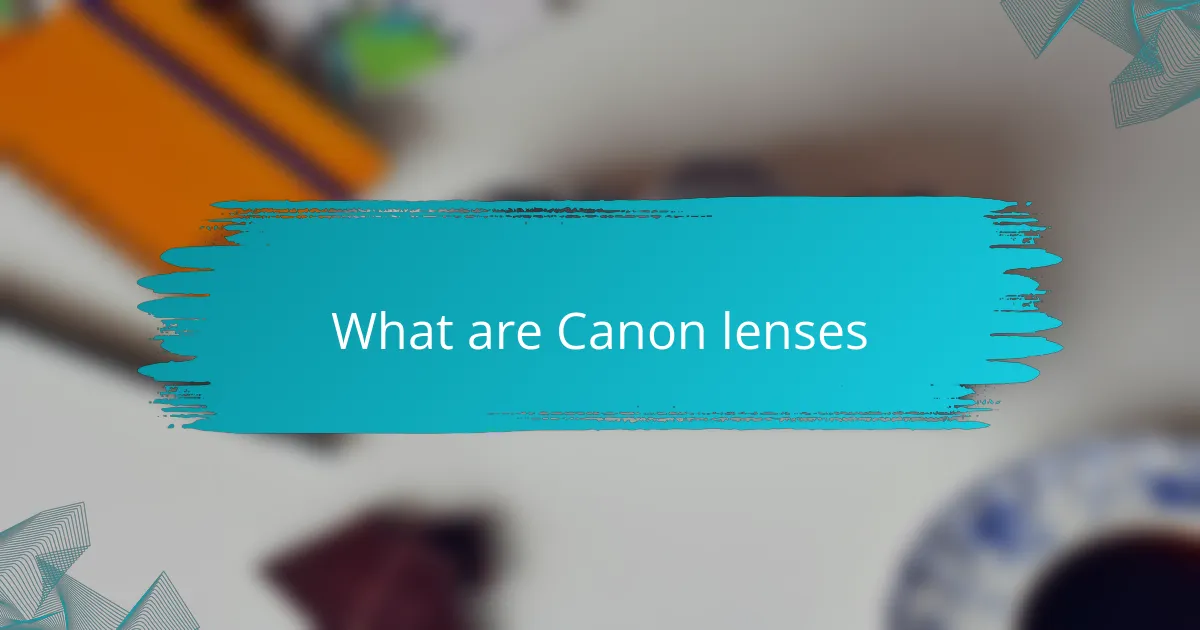
What are Canon lenses
Canon lenses are renowned for their exceptional quality and versatility, making them a favorite among photographers, especially in wedding photography. As someone who has used Canon lenses extensively, I’ve always appreciated how they can elevate the quality of portraits, bringing out the best in natural light and offering stunning bokeh effects. I’ve found that using the right lens not only enhances the image but also helps convey the emotions of the moment beautifully.
When choosing a Canon lens for portraits, here are some noteworthy options to consider:
- 50mm f/1.8: Often referred to as the “nifty fifty,” this lens is perfect for capturing sharp images with creamy backgrounds, ideal for focusing on couples’ expressions.
- 85mm f/1.8: This lens is renowned for its flattering compression and is great for close-up portraits, allowing for intimate shots that show genuine feelings.
- 24-70mm f/2.8: A versatile zoom lens that covers a range of focal lengths, making it a go-to for capturing everything from wide group shots to close-up details of the bride and groom.
- 70-200mm f/2.8: This lens provides excellent reach and stunning background blur, perfect for candid moments without invading personal space.
Selecting the right Canon lens transforms not just the image, but the entire shooting experience. I still remember a wedding where my 85mm lens perfectly captured the joyful tears of the bride during her vows—moments like these remind me why I love portrait photography so much.
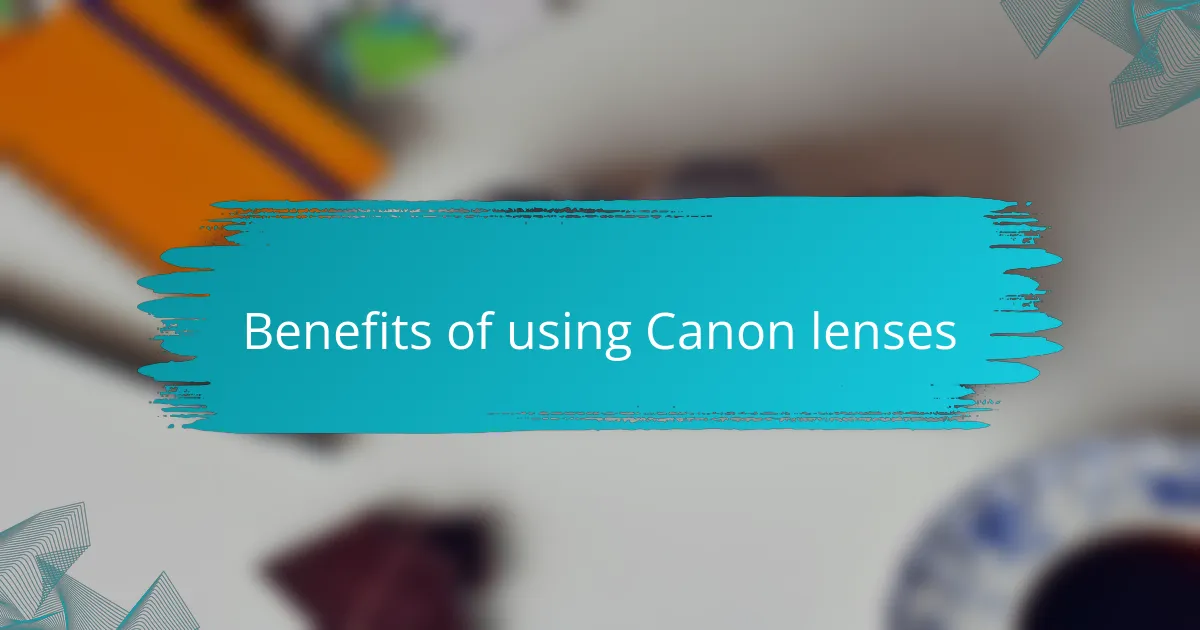
Benefits of using Canon lenses
When I think about the benefits of using Canon lenses, one thing comes to mind: the clarity and sharpness they provide. During a recent wedding shoot, I switched to my 50mm f/1.8 lens for the couple’s first dance. The details were incredible—their expressions, the twinkling lights in the background—all came together in a way that truly told their love story. There’s just something magical about how Canon lenses render colors and contrast, enhancing portraits significantly.
Another aspect I cherish is the ability to create beautiful background blur, or bokeh, which draws attention to the subject. I often rely on my 85mm f/1.8 lens for this purpose. The first time I used it, I was blown away by how the soft background made the emotions of the couple pop. It’s like having a painting where the subject stands out effortlessly, making each portrait not just a photograph but an emotional experience.
Finally, let’s talk about versatility. With a 24-70mm f/2.8 lens in my bag, I feel like I can tackle any moment, from wide venues to intimate close-ups. At one wedding, I captured everything from candid laughter to heartfelt moments during the vows without needing to swap lenses constantly. It’s these little things, combined with Canon’s quality, that reaffirm my choice over and over again. Isn’t it fascinating how the right lens can shape not just an image, but also the entire narrative of a couple’s special day?
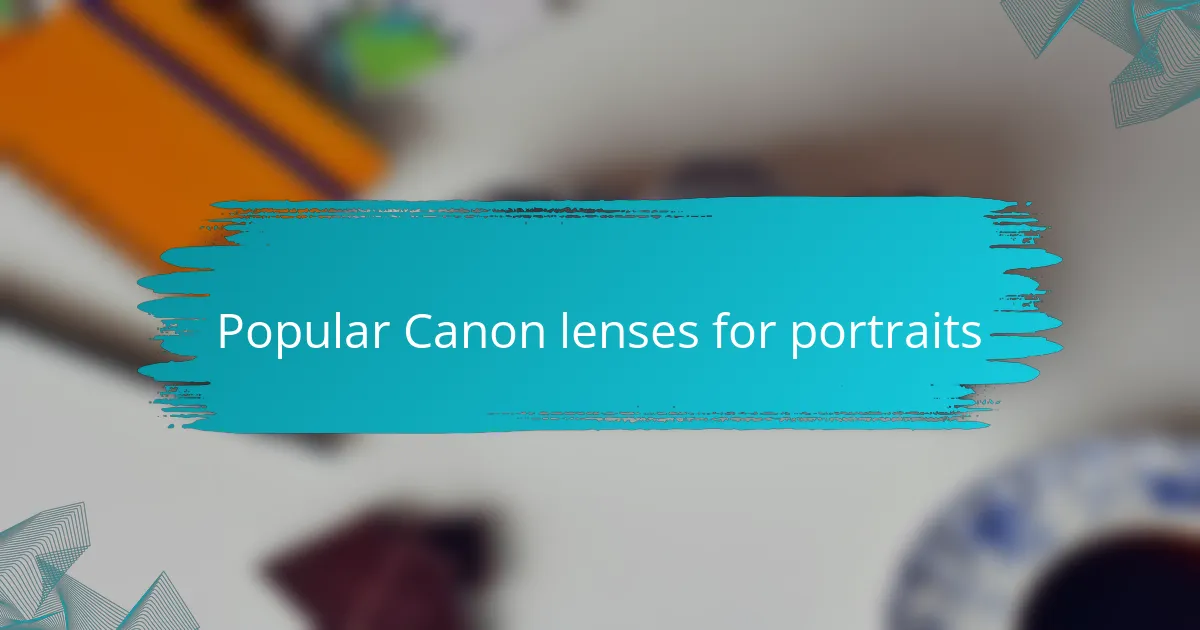
Popular Canon lenses for portraits
When it comes to popular Canon lenses for portraits, the 50mm f/1.8 truly stands out as a must-have. I still remember the first time I used it at a wedding; the way it captured the couples’ laughter, with that dreamy background blur, sent shivers down my spine. It’s amazing how a simple lens can elevate the overall feel of a portrait, focusing entirely on the emotions that tell the story of that day.
The 85mm f/1.8 is another gem that has become my go-to for close-up shots. I recall a moment during a ceremony when tears filled the bride’s eyes while she exchanged vows. Using the 85mm, I was able to capture those intimate details from a distance, preserving the authenticity of the moment without disrupting the flow. Isn’t it remarkable how the right focal length can create a bridge between the viewer and the subject?
Lastly, having the 24-70mm f/2.8 in my kit gives me incredible flexibility. It’s like having the perfect toolkit for wedding photography. During one wedding, I switched effortlessly between wide group shots and intimate close-ups of the rings being exchanged, all while maintaining that same beautiful quality. How can one lens take you through an entire day with such ease? It’s these experiences that define why I trust Canon lenses for every portrait I capture.
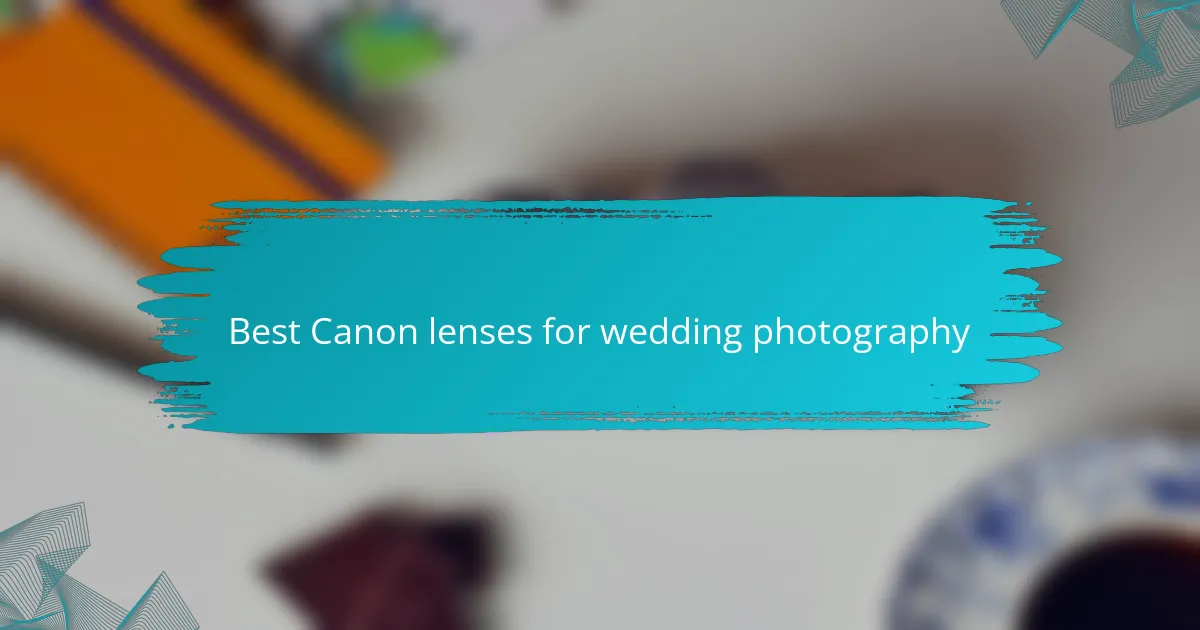
Best Canon lenses for wedding photography
When diving into the world of wedding photography, the choice of lens can profoundly impact the captured moments. I’ve often reached for my Canon 50mm f/1.2L for portraits because of its exceptional sharpness and beautiful bokeh. There’s something magical about the way it isolates the subject against a softly blurred background, making each shot feel intimate and special.
On the other hand, the Canon 24-70mm f/2.8L is another staple in my camera bag. This versatile lens is perfect for capturing both the grand scenes of a wedding and up-close portraits, letting me adapt to various situations effortlessly. It’s given me the flexibility to frame stunning shots while not losing that emotional connection with the couple and their families.
Here’s a list of my top Canon lenses that excel in wedding photography:
- Canon 50mm f/1.2L: Fantastic for portraits; delivers beautiful bokeh.
- Canon 24-70mm f/2.8L: Versatile zoom for various shots; ideal for candid moments.
- Canon 85mm f/1.4L: Excellent for capturing emotions; provides flattering perspectives for portraits.
- Canon 70-200mm f/2.8L: Perfect for candids from a distance; great compression for stunning backgrounds.
- Canon 35mm f/1.4L: Wide-angle for dynamic shots; ideal for capturing venue details and group shots.
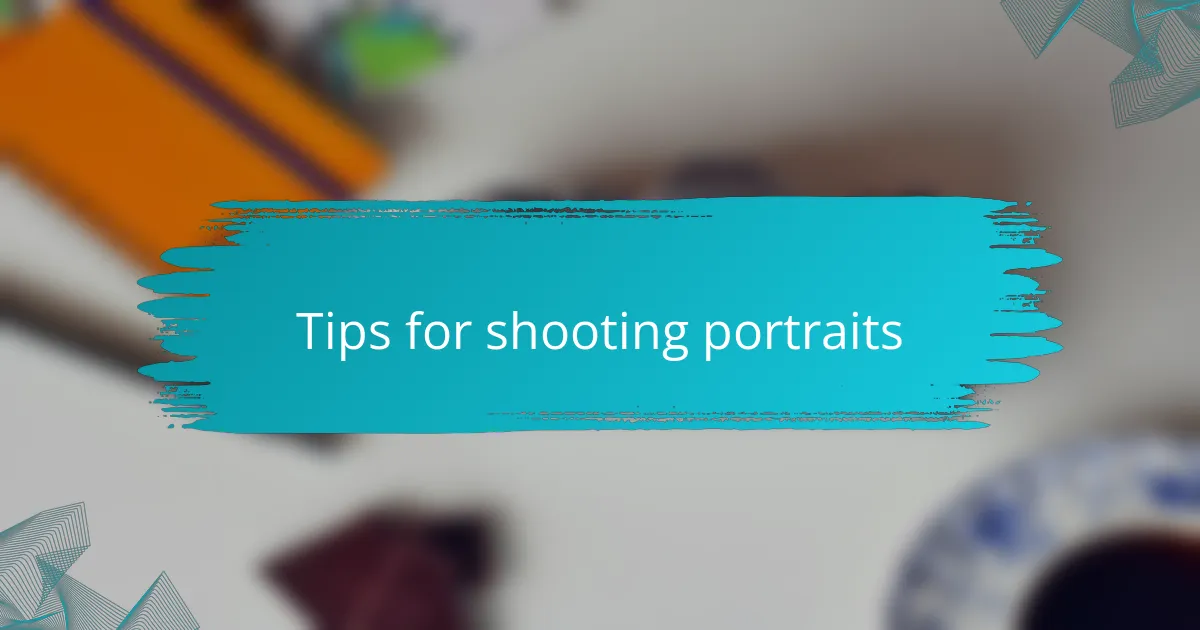
Tips for shooting portraits
When shooting portraits with Canon lenses, I find it crucial to pay attention to the lighting. Natural light can create beautiful, soft shadows that enhance the subject’s features. I often position my clients near windows or in shaded areas to achieve that flattering look.
Another tip I recommend is to use a wider aperture, like f/1.8 or f/2.8. This not only blurs the background beautifully but also draws more focus to the subject. I remember capturing a couple against a sunset; the bokeh effect truly made them pop in the frame.
Lastly, don’t hesitate to experiment with different focal lengths. I love the intimate feel of an 85mm lens for close-ups, while a 50mm can work wonders for full-body shots. Each lens brings its own character to the portraits, allowing you to tell unique stories through images.
| Lens Type | Ideal Use |
|---|---|
| 50mm | Versatile for both headshots and full-body portraits |
| 85mm | Great for close-ups with a flattering compression |
| 24-70mm | Flexibility in framing, good for on-the-go shooting |
| 135mm | Perfect for candid shots with beautiful background blur |
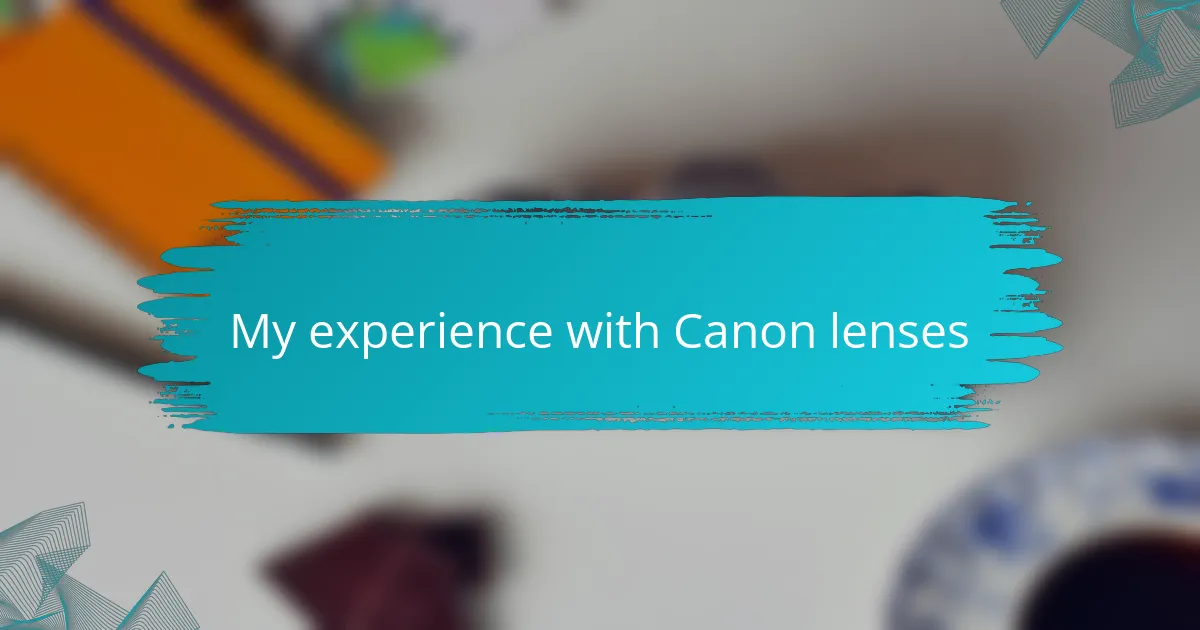
My experience with Canon lenses
When it comes to Canon lenses, I’ve found them to be incredibly versatile and reliable for portrait photography, especially in wedding settings. I still remember the first time I used the Canon 85mm f/1.8 lens; the bokeh it produces is simply magical. This lens allowed me to capture those intimate moments between couples, bringing the background beautifully out of focus.
In my experience, the depth of field and sharpness of Canon’s prime lenses make them my go-to choices for portraits. I often choose to work with the Canon 50mm f/1.2 when I want to create a dreamy aesthetic—its ability to isolate subjects is just phenomenal. Each lens lends a distinct character to the photos, making it an exciting process to choose which one fits the mood of the day.
Here’s a comparison table of a couple of my favorite Canon lenses for portrait photography:
| Lens Model | Key Features |
|---|---|
| Canon 85mm f/1.8 | Great bokeh, sharp images, ideal for headshots |
| Canon 50mm f/1.2 | Fast aperture, beautiful subject isolation, excellent low light performance |
